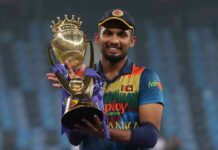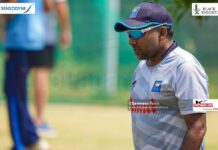It was full time at Estadio Malvinas, Mendoza as the Pumas celebrated their first ever win at the Rugby Championship.
The 21-17 triumph over Australia amidst the vibrant local chants resonated a long awaited moment. After having the RWC as the only major competition in their calendar, a spot in the premier southern hemispheric tournament was richly deserved. Moreover, it took years of relentless battering to prove themselves as a powerhouse of the oval ball. Perhaps, it all started at the 2007 Rugby World Cup when a passionate and resolute outfit decided to take the stage by storm and place their name on the Rugby map.
The highest stage demanded the lion-hearted Pumas to face the toughest challenges. Entering the tournament, at the helm was skipper Agustin Pichot who was given the arduous task of not only leading his men and creating the vital link between the staunch forwards and the talented backs but also providing inspiration on the field.
Despite appearing in every edition of the RWC since 1987, a quarterfinal finish in 1999 had previously been their best performance. However, they’ve had their moments to cherish, including Gonzalo Quesada (a.k.a Speedy Gonzalo) slotting in a record 31 penalties and becoming the top scorer at RWC 1999 with 102 points. It was a glorious achievement for a nation which by the time had already produced arguably the greatest fly half of that century, Hugo Porta. But a more startling narrative on the grandest stage was yet to be scripted.
The team was brimming with confidence under Pichot’s leadership and victories against England and Wales in 2006 boosted their confidence en route to France 2007.

The dark horses from the land of South America possessed a lineup that boasted strong-willed forwards Rodrigo Roncero, Martin Scelzo, Mario Ledesma, Patricio Albacete, Juan Manuel Leguizamon and the Lobbe brothers to name a few. With the skipper himself at scrumhalf, the fast paced and gifted backs consisted of fly half Juan Martin Hernandez, the Contepomi twins (Felipe and Manuel) at Centre, Borges-Agulla collaboration at wing and speedster Ignacio Corleto at fullback.
The fairytale run began on 7th September at Paris against hosts France in the opening game of the 2007 RWC. It was the third successive time that the Pumas had contested in the opening game of a World Cup and with previous defeats to Wales and Australia in 1999 and 2003; the battalion was determined to turn the tables this time around. With the ‘Himno Argentino’ echoing around Stade de France, emotions took over as the world watched them gearing up for an dream run, with the ground work laid by Marcelo Loffreda’s quality game plan.

Felipe Contepomi opened the scoring with a penalty in the 5th minute before David Skrela equalized for France. Deep inside the French territory the Pumas were offered two more penalties which Contepomi slotted in to give the Pumas a 9-3 lead midway through the first half. Minutes later, a threatening move by the French Centre Damien Traille saw Remy Martin, whose ultimate pass was cleverly intercepted by Pichot before Contepomi found the hands of Corleto who made a splendid 40m sprint to score the first try of France 2007. Upon missing the conversion, Contepomi scored another penalty to give the Pumas a 17-9 lead at the half and despite French resistance resulting in a penalty by Skrela, Argentina held on to a historic 17-12 win. As 80,000 local fans stood confounded, France became the first home side since 1991 to lose an opening RWC game.

Argentina crushed Georgia 33-3 in Lyon in their next game before trouncing Namibia 63-3 at Marseille a fortnight later. When the Pumas took on the Shamrock in a decisive game at Parc de Princes, all eyes were on the underdogs but many were backing the Irish to secure a win. After Contepomi missed an opportunity to put Argentina in the lead, it didn’t take them long to open the scoring through Lucas Borges. Following a penalty by Ronan O’Gara for the Irish, Agustin Pichot shipped a timely pass to Juan Martin Hernandez who unleashed a terrific drop goal to give the Pumas the lead at 8-3. With the pendulum swinging both ways, Ireland came back to score a blistering try through skipper Brian O’Driscoll, claiming the lead for the first time. The Pumas seemed to be foiled, until Hernandez delivered another delightful drop goal before Horacio Agulla went over the line, leaving the Irish defence in shambles at halfway. A Geordan Murphy try gave hope to the Irish with the scores at 21-15 but further Contepomi penalties added points for the men in blue. Another apt pass by Pichot resulted in Hernandez’s third drop goal, this time with his left foot, sealed their unbeaten tag as the Pumas went into the knockouts only for the second time in history with a convincing 30-15 win.
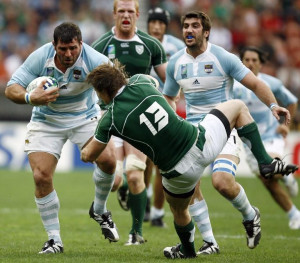
As the competition got strenuous, the Pumas locked horns with a formidable Scotland side on 7th October at packed Stade de France. As the team huddled moments before the confrontation, their desire seemed clear, to reach a semifinal for the first time in their history.
Although Dan Parks put Scotland in front, Contepomi responded with two penalties before Gonzalo Longo charged down a Dan Parks kick and subsequently scored a try. The half time score of 13-6 was challenged by Scotland but the sky blue and white defensive wall absorbed wave after wave of Scottish onslaughts before salvaging a taxing 19-13 victory.
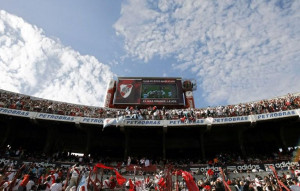
As a nation rallied around the Pumas, even the ‘Superclassico’ between local football rivals Boca Juniors and River Plate was delayed.
Their scintillating run finally ended in a semifinal loss to eventual champions South Africa but the courageous Pumas reaffirmed their supremacy over France yet again during third place play off with an even more resounding 34-10 win, obtaining the bronze medal to conclude one of the most remarkable World Cup stories of all time.
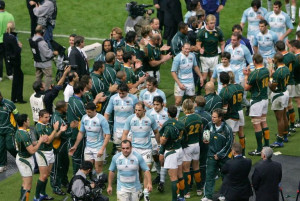
From the sturdy forwards to the nippy back line, it was the devout warriors of 2007 whose startling heroics, initiated a new era in Argentine rugby steering it to greater heights. Agustin Pichot, who marshaled the brigade through example, motivation and superior qualities of standing by his troupe for justice, rightful merits and accolades, was inducted to the IRB Hall of Fame, becoming only the second Argentine after Hugo Porta to enter his name.
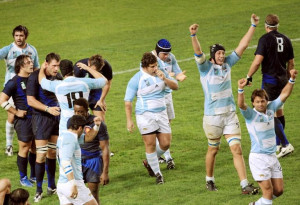
No doubt the foundation for Argentina’s success story was laid by the team of 2007. The feat led to their inclusion in the tri-nations and with Super Rugby expanding to 18 teams from 2016, professional rugby made its journey to the ‘Land of Silver’, a dream seemed too far when the game turned professional in 1995.
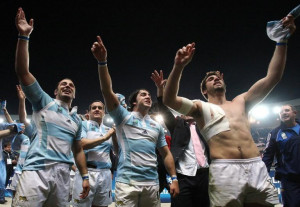
Arguably the greatest underdog story in Rugby World Cup history, these combatants will be remembered for what the South American side warrants today, an achievement that sounded far-fetched a decade ago.




